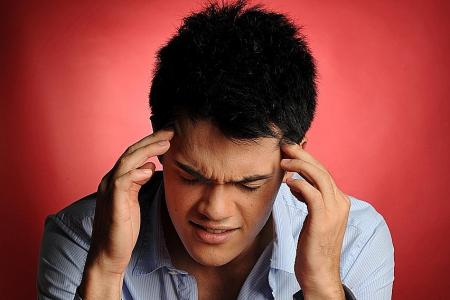Don't dismiss your dizzy spells
Sudden giddiness could hint at something more serious, such as diabetes or a brain tumour
Dizzy spells are scary, especially if they hit you without warning.
It is best not to ignore such episodes as they could hint at something more serious. Here are some possibilities and what to do about them.
DEHYDRATION
Symptoms: Dry eyes and mouth, palpitations and lethargy. Also, dry skin that does not bounce back when pinched into a fold.
Why it happens: Excessive sweating, vomiting and diarrhoea all lead to dehydration when you lose more fluid than you take in.
How to treat dehydration: Sip water in small amounts through a straw and drink fluids with electrolytes like isotonic drinks.
In cases of severe dehydration, when one is semi-conscious or has fits, immediate medical attention is needed, noted the UK National Health Service.
DIABETES
Symptoms: According to SingHealth, extreme fatigue, blurred vision, serious thirst or hunger despite following a proper diet, frequent urination, slow-healing wounds and weight loss are all symptoms of diabetes.
Why it happens: When someone has diabetes, his body does not produce enough insulin or cannot effectively use this hormone that converts glucose into energy.
This causes blood glucose levels to be persistently higher than normal.
Left uncontrolled, diabetes can lead to more serious conditions like kidney disease and heart attack.
How to treat diabetes: Diabetes can be managed by watching one's diet to maintain blood sugar levels.
Regular exercise also helps insulin to work better. If lifestyle changes do not help, medication or insulin injections may be next.
MENIERE'S DISEASE
Symptoms: Besides vertigo (the sensation of a spinning motion) accompanied by nausea and vomiting, other characteristics of this inner-ear disorder are fluctuating hearing loss as well as pressure and ringing in one ear (tinnitus), said Dr Ho Eu Chin, consultant at the Ear, Nose and Throat Department at Tan Tock Seng Hospital.
Why it happens: It is caused by an excessive build-up of the fluid in the inner ear due to overproduction or inadequate drainage.
How to treat Meniere's disease: Reducing stress and cutting down on caffeine, alcohol and salt may help.
Alternatively, medicine and surgery to drain away the fluid might be recommended.
BRAIN TUMOUR
Symptoms: Giddiness might be accompanied by any of three main groups of symptoms - those linked to raised pressure in the brain (like headaches that strike in the morning and only get better after vomiting), those linked to the tumour's location (such as muscle weakness if it is in the area of the brain that controls movement) and finally, seizures, said Associate Professor Ng Wai Hoe, medical director and senior consultant at the Department of Neurosurgery at the National Neuroscience Institute (NNI).
Why it happens: The tumour forms when normal cells in the brain change and grow uncontrollably, forming a mass.
How to treat brain tumours: Surgery is usually needed to help reduce pressure on the brain. If the tumour is cancerous, radiation therapy or chemotherapy may be administered.
STROKE
Symptoms: Remember these tell-tale signs with the acronym FAST, said Dr Deidre Anne De Silva, senior consultant from the Department of Neurology at NNI.
"If one side of the face (F) droops when smiling, or if you can't raise or hold up an arm (A) and have slurred or incoherent speech (S), you could be having a stroke," she said.
"Call an ambulance at once, let the operator know that it could be a stroke and get to a hospital in the shortest possible time (T)."
Prompt treatment can make a difference in recovery.
Other symptoms to look out for include sudden numbness on one side, coordination difficulty and double vision.
Why it happens: Strokes occur when blood supply to a part of the brain is cut off.
This could result from an artery clogged by fat or cholesterol. Or a clot from the heart that travelled to the brain and blocked an artery.
How to treat strokes: Clot-busting drugs may be given to clear the obstructed artery and encourage blood flow back to the brain.
In more severe cases, surgery may be needed.
This article was first published on www.shape.com.sg
Get The New Paper on your phone with the free TNP app. Download from the Apple App Store or Google Play Store now


